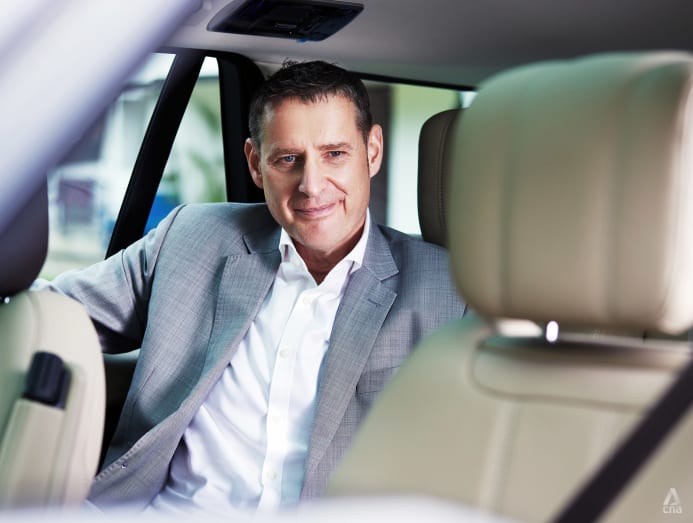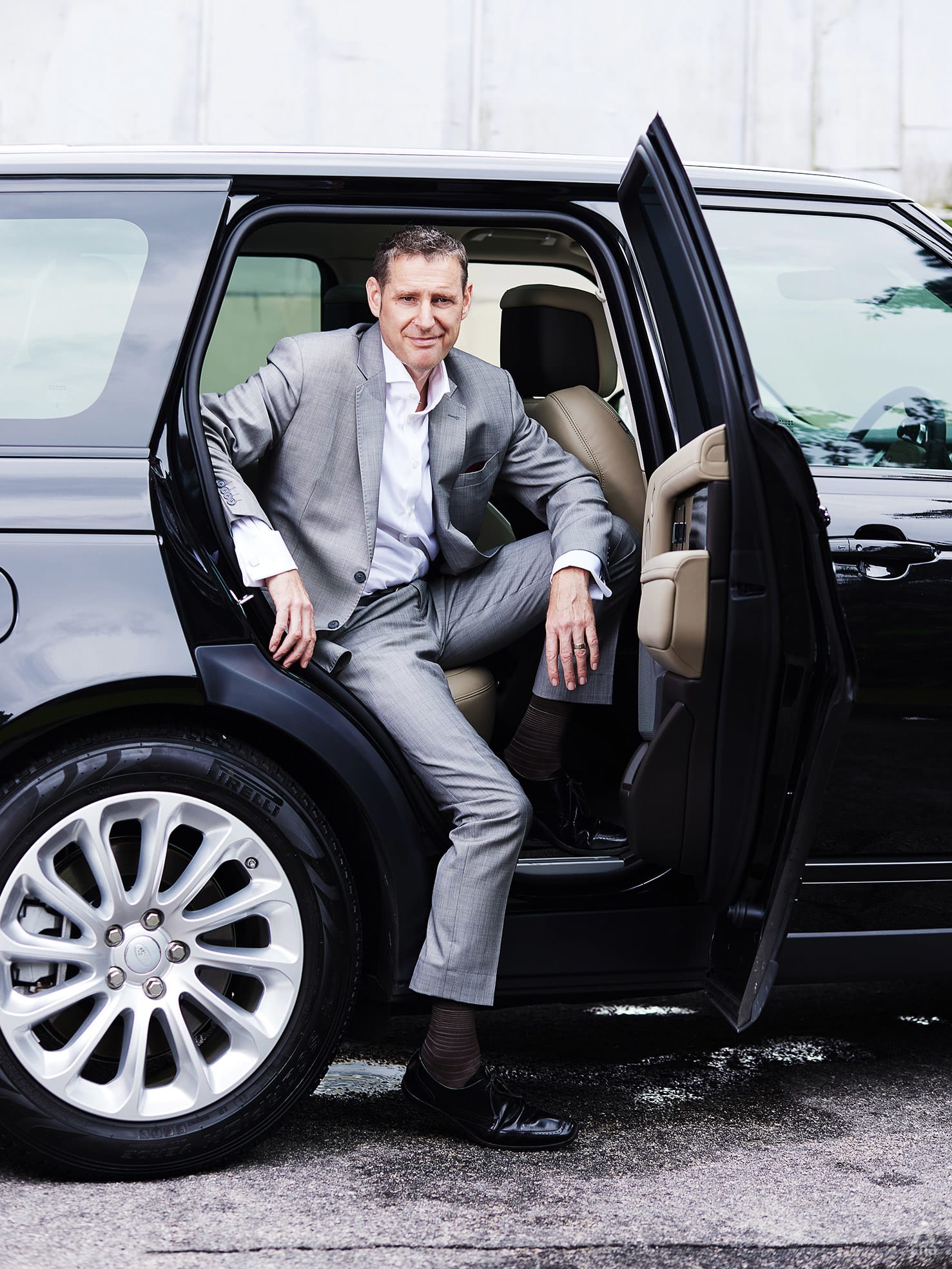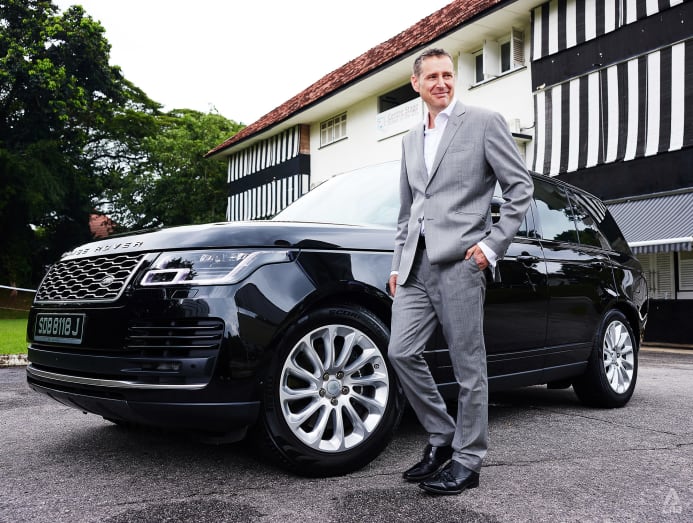Meet the British MD of Jaguar Land Rover, who speaks Korean
In the first of a new series, The Backseat Interview, we take a ride with Alistair Scott, managing director of Jaguar Land Rover APAC, in the back of a Range Rover, and chat about his getting lost in the Gobi desert, the future of electric vehicles and his Korean connection.

In 2020, Alistair Scott assumed the role of acting managing director for Jaguar Land Rover APAC and was formally appointed in May this year. (Photo: Kelvin Chia)
In life, you just have to take a leap of faith sometimes. That’s how Alistair Scott’s journey to Asia first began some 30 years ago.
The year was 1992 and Scott was at university in Newcastle, the United Kingdom, when a prompt from one of his professors inspired him to switch degrees from a politics major to East Asian studies where he would then learn the Korean language and embark on an exchange programme to South Korea.
“I said ‘yes’ without even thinking about it and it was probably the best career move I ever made without realising it at the time, because I never would have travelled and studied or worked overseas otherwise,” he said, recollecting one of the most pivotal moments of his life.
And travel extensively he has.
Intriguingly, Scott spent part of his childhood growing up in Nigeria as his father worked in the African country in the late 1970s to early 1980s.
“That was an interesting time to be living out there as a young boy. To be at that age, around 10 or 11, in that part of the world, was quite an unusual upbringing,” he recalled.
During university, Scott would fly back and forth between Newcastle and Hong Kong where his father was based for a good decade in the 1990s.
Upon graduating, he moved to Vietnam, trailing his Dad in his relocation and armed with a plan to use the former French colony as a base from which to explore the region.
“But I soon ran out of money so I had to start working in Vietnam, for leasing agency Chesterton Petty, letting apartments out to diplomats and foreign nationals,” shared Scott.
Meanwhile, his former professor, who still kept strong government ties back home, ended up being invited back to South Korea to take on the role of press secretary to former South Korean President Kim Dae-jung.
Eventually, the Brit did put his Korean studies to good use during his four-year stint working in South Korea, which served to deepen his love for the Asia-Pacific.
And he still hopes to one day visit North Korea.

“Two of my friends have been there through a charity organisation in Beijing but I never made it when I had the chance. Because my degree was on Korea and I studied international relations – specifically North Korean and South Korean politics – and what happened in the war and post-war, I’m very intrigued with North Korea as a nation and I’d like to go visit. It’s a shame that a wonderful country such as Korea just split and there’s no sign of it ever being reunified,” he shared.
Of all his travels in the world, Scott’s most memorable experience was his trip through the Gobi desert as part of an ambitious months-long overland journey from Hanoi to Helsinki in an old UAZ Russian van almost two decades ago.
“Those six weeks were really wonderful and exciting taking in the beautiful landscape and terrain. I got lost in the Gobi. And I had a driver, a Mongolian gentleman called Goonga, who turned up with his wife and son without telling us and we ended up travelling together as sort of a family,” he reminisced.
Scott was 31 at the time and now in his 50s looking back on the biggest life lesson travelling has taught him that parlays well into business and leadership, it’s “patience, patience, patience,” he said.
“Because you get put in circumstances that can be very difficult and challenging, and regardless of your emotions or how you feel at the time, you just have to suck it up, bear with it and take it onboard,” he added.
His advice for other travellers – when we can globetrot again freely – is to have an appreciation for others’ surroundings.
“What might be the norm in your home country is not necessarily the norm when you’re travelling, and that teaches you to be more tolerant,” he offered.
THE FUTURE OF ELECTRIFICATION: WIRELESS CAR CHARGING
A true global citizen will, invariably, end up in Singapore at some point in their career or lifetime and Scott arrived four years ago with his wife and two teenaged daughters.
He had joined Jaguar Land Rover in 2013 as a regional business manager in the UK responsible for the Brazil, Latin America & Caribbean, Australia and Asian markets then moved up to sales director for the Asia-Pacific (APAC) region.
In 2020, he assumed the role of acting managing director for APAC and was formally appointed in May this year.
While it’s been a whirlwind 12 months steering the company through these transformative headwinds, it’s also been very exciting for the business leader.
“The industry is going through many changes right now but having the next level of management control and the ability to determine the long-term path of the business and where we want to lead the region is very exciting for me,” he said.
To be sure, the automotive industry is at an inflection point in history, and Scott has witnessed the industry transform tremendously in his 25 years working in the auto world; eight of which with Jaguar Land Rover.
The greatest challenge for most carmakers right now is the inescapable push towards electrification, with Jaguar Land Rover leading the charge.
The Indian-owned, UK-headquartered British brand was one of the first in the automotive industry to make such a bold declaration of producing purely electrified vehicles under the Jaguar brand by 2025, as part of its “Reimagine” global strategy.
Land Rover, meanwhile, will drive along the same track, but with a slightly longer timeline, with its first all-electric model to arrive in 2024 and all new models produced offering MHEV and PHEV hybrid variants by 2030.
“There’s an expectation that by around 2030, 60 per cent of all sales will be pure electric and won’t be running on the internal combustion engines as we know it today,” said Scott.
The automaker also aims to achieve net zero carbon emissions across its supply chain, products and operations by 2039.
That said, these strategies will need to be carefully calibrated against market readiness across the different countries to ensure the necessary infrastructure and policies are in place to support the shift.
“Many markets have shifting policies in emissions and support, and different incentives. So long as that exists, there will be a need for different forms of electrified vehicles including standard hybrids,” Scott reasoned.
Manufacturing of vehicles with diesel engines will also be phased out by 2026.
“The industry is rapidly changing and we know that diesel is no longer popular here in Singapore as a consequence of the Vehicles Emissions Scheme,” he observed.
Singapore, Scott believes, is the market in which the electric conversion ought to meet with success.

“If any country can influence change in any industry, Singapore is probably in the strongest position to do so because of the very nature of the government. They have very strong infrastructure within the country, they’re nimble, they’re able to make quick decisions and it’s a nation-state where economies of scale are easy to manage,” he noted.
“Unquestionably, there will be challenges but if any country plans ahead, there is no country – as far as I can see – in this part of the world that can plan ahead as quickly and with such ability to deliver on their commitments [as Singapore],” he added.
To this end, Jaguar Land Rover is in talks with the Land Transport Authority to explore a wireless charging programme in Singapore similar to its initiative with the city of Oslo in Norway.
Through this pilot programme, Oslo became the first city in the world to install wireless, induction-based high-powered charging bays for electric taxis.
The system uses no cables and works via resonant magnetic induction between a transmitter pad embedded under the road surface and a receiver pad attached to the base of the vehicle. It therefore requires no physical connection between charger and vehicle, unlike current charging stations available today.
“So as soon as the vehicle drives over it, within a split second, it automatically starts charging and you don’t even need to get out of the car,” Scott explained.
“It’s really exciting because many people complain that they don’t have a charging station in their house and it’s of course easier to install one in landed properties than in HDB areas,” he elaborated.
The company is also working with the government of New Zealand to implement such a programme in the city of Wellington, and Scott hopes to bring that technology to Singapore to help facilitate more widespread adoption of electric vehicles here.

A CARPE DIEM KINDA GUY
Eclectic background aside, Scott strikes you as a carpe diem kind of guy with a penchant for extreme travel and sports.
He’s into biking and cycles a lot – two to three times a week, covering about 200km in total each week – and also enjoys cooking: Italian, mostly, but Latin cuisine on weekends.
“It’s a really good way to wind down and de-stress,” he shared.
Staying stuck in one country this long has been tough for the adventurous spirit but reflecting back on his university days and the Korean connection that led him to Asia, Scott mused: “Sometimes it’s instinct; sometimes you see an opportunity, you just take it. I’m fortunate enough to have done that and here I am today. And I did a politics degree; there’s no reason why I should end up in the automotive industry.”











